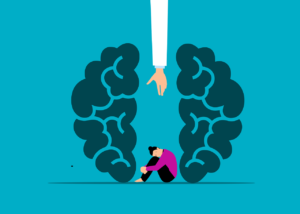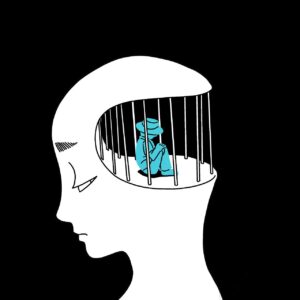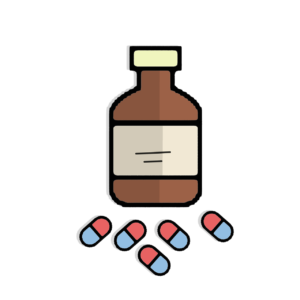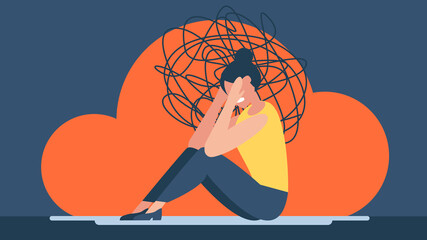What is mental health stigma?
Mental health Stigma is the negative attitude (prejudice) and the negative responses (discrimination) towards mental health. Mental health stigma creates misinformation, myths, stereotypes, and confusion. All of which bring shame to people who are struggling with their mental health. This shame prevents people from seeking help when needed and can make coping with poor mental health a daily challenge. To stop the stigma we have to understand what they are and why they exist. Listed below are a few stereotypes and myths about mental health.

1) Those who are struggling with mental health are violent and dangerous.
People often believe that a person with a mental health diagnosis is violent and dangerous. According to studies while there may be a link between mental illness and violent behavior, there are many factors that contribute to this link. These factors include extreme traumatic experiences, substance abuse, prolonged stress, and other environmental factors. Taking these factors into consideration, the correlation between violent behavior and mental illness varies with each individual. On the contrary, studies have shown that most people diagnosed with mental illness are not violent at all. This means that while there may be a link, violent behavior does not apply to every person with a mental health diagnosis. This also indicates that many factors other than mental illness play a role in violent behavior. This stereotype makes people push away loved ones out of fear that they will not be safe. This results in the lack of a support system and can worsen symptoms of mental illness.

2) Mental illness is not real it is a mindset problem
Unfortunately, there is a belief that mental illness is nothing more than a mindset problem, and by changing your mindset your mental illness will magically go away. This is a myth. Mental illness and personal mindset are not synonymous with each other. A mental illness is defined as a psychological illness that negatively affects how you think and behave. Mindset is your attitude/perception based on belief. Although they are two different concepts, there is a strong relationship between the two. Mental illness can impact your mindset, and your mindset can impact your mental illness. For example, changing your mindset can help with managing symptoms. However, this does not mean that your mindset will magically make a mental illness go away. Many mental disorders come with symptoms including an alteration of an individual’s perception of reality. This altered perception makes it a daily challenge to see things outside of that altered reality. (you can read a more in-depth explanation of what illness means and why it is a real thing)

3) Mental illnesses are untreatable
Like a physical illness Medication, therapy, and lifestyle changes can treat mental illnesses. The myth that mental illness is untreatable can cause people to feel like they will never be able to accomplish life goals or live a “normal” life. This eventually leads people with mental illness to avoid seeking resources and services that can guide them toward a happy fulfilling life. Avoiding support or services can worsen any symptoms you may be experiencing. This can make managing poor mental health a big challenge.
4) Therapy and medication are scams
It’s normal for people to be curious about whether therapy and medication are beneficial. However, sometimes this curiosity leads to the assumption that therapy and medication are scams. A scam by definition is something that is a fraud and takes advantage of people. Therapy and medication exist to support people who are struggling with their mental health. For example: someone diagnosed with schizophrenia may rely on medication to make managing symptoms easier. Someone who does not have a support system can rely on therapy to be heard, and work on creating healthy behaviors and thought patterns. This is not to say that therapy and medication are the answer for everyone, but it is a reliable option that people can use to better their mental health. Having reliable resources to help better your mental health is not a scam and can be beneficial for anyone.

5) Kids can’t have depression…what do they have to stress about?
A child may not have the same problems as an adult but that does not mean they are not at risk of becoming stressed. Stress can be caused by anything that puts us in a state of pressure or tension. For children this can be situations such as bullying, issues at home, trying to meet expectations, death in a family, adapting to new environments, child abuse, neglect, etc.
(image)
Unfortunately, feelings of prolonged stress, loneliness, and sadness can lead to depression. So unless a child is a robot who is incapable of having emotions/feelings, a child can experience depression. It’s also important to remember that children are learning how to manage and cope with emotions. This is why creating a safe space for children that is free from stigma is important. Children deserve support and the proper resources when it comes to their mental health and emotional wellness.
6) people with mental health issues are being dramatic
How someone reacts to challenges or life problems may be different from how you would react, but that doesn’t make their reactions any less valid. You should keep in mind that a person who is experiencing a mental illness such as depression or anxiety, may be having symptoms that you may not understand. What you view as dramatic may be a daily challenge that they wish they didn’t have
Ways To End The Stigma
1. Stop Using mental disorders/psychiatric terms as adjectives
Mental disorders are NOT adjectives and should not be used to describe someone. Mental disorders are terms used to describe a medical condition and a set of symptoms. Symptoms that can have a huge impact on someone’s everyday life. Some examples of using mental disorders as adjectives include:
- you look so anorexic
- She has to have everything organized she’s so OCD
- I was so depressed yesterday but I’m better now
- All women are bi-polar
Using mental disorders as adjectives creates confusion on the meaning of mental health terms. For example, using the phrase “I was so depressed yesterday” when you were actually “sad” takes the experience away from someone who is dealing with depression. It is saying that feeling sad is the same as being depressed when those two things have completely different meanings. The best way to avoid this is to remember that terms used as mental diagnoses are not personality traits but are medical diagnoses that describe someone’s symptoms.
2. Educate
By being educated on what poor mental health is we can erase the labels and negative stereotypes that describe those with mental illness. To educate yourself read books, listen to podcasts created by professionals, become familiar with different mental health terms, and most importantly share that information.
3. Prioritize your mental health
Your mental health is about your ability to solve life problems, having healthy behavior/thought patterns, emotional wellness, and being mindful of the information you feed your brain daily. All of these things make up your mental health and impact your ability to have a fulfilling life. We all have a mind to nourish and maintain the same way we have a body to take care of. Therefore Mental health stigma is a huge problem that doesn’t just affect those who are diagnosed with a mental illness but anyone who is striving to better their mental health. As you strive to prioritize your mental health you can influence others to do the same. Together we can break down those stigmas and inform others that mental health effects ALL of us and is not just inclusive to people with a medical diagnosis.
4. Speak up
Speaking up is the most important way to end the stigma. If you hear or see something that contributes to mental health stigma, speak up on why it is not correct and how it is negatively affecting people who are struggling with their mental health. You can also be an advocate for mental health by sharing your story, volunteering for a mental health organization, or joining a mental health movement. Always remember that your actions speak just as much as your words.
5. Express empathy
Empathy comes a long way when it comes to ending stigma. Many times we are quick to judge without understanding or taking the time to listen to someone’s situation and how they are feeling. When we are quick to form an opinion it’s easy for stigma to be created. Here are tips on developing empathy
- Take a moment to listen: Many people struggling with a mental health illness often feel unheard or misunderstood. Being an effective listener can help build empathy and create a safe space where that person can feel heard. To learn how to be an effective listener, take a look at this post. (https://www.bhf.org.uk/informationsupport/heart-matters-magazine/wellbeing/how-to-talk-about-health-problems/active-listening)
- Don’t assume: Being empathetic doesn’t mean making assumptions about what the person is thinking or saying. Unless the person says directly what they are feeling or thinking it’s best not to assume. Instead, ask direct questions. Some questions you can ask are: How are you feeling? How long have you been feeling this way? How has the situation affected you?
- Validating + Offering support: Often people will make empathy all about understanding someone completely. Truth be told unless we have had the same experience we may not fully understand. We may also be in a situation where we don’t know what to say. And that’s okay. Part of being empathetic means acknowledging how the person is feeling and offering support. Offering Support can be creating a safe space for them to vent, providing company, researching the person’s mental illness, comforting them in a time of distress, or offering an extra hand when seeking mental health resources. If you don’t know what you can do to give support ask the person directly what can you do to support them through the hard time. ‘
Normalize therapy and other mental health services/treatment
Therapy and medication as mentioned can be useful to cope with the symptoms of mental illness. Normalizing these treatments can create a society where maintaining your mental health is no different than maintaining your physical health.
To get rid of any skepticism, keep yourself informed. Research the side effects and the impact that prescribed medication has on your physical and mental state. As for therapy, it’s important to remember that finding a therapist that is right for you can be a process.
Conclusion
Mental health isn’t just a relevant topic that is inclusive to those with a diagnosis, it is relevant to everyone. Our mental well-being is just as important as our physical and we must take care of our mental health the same way we would with our physical body.
